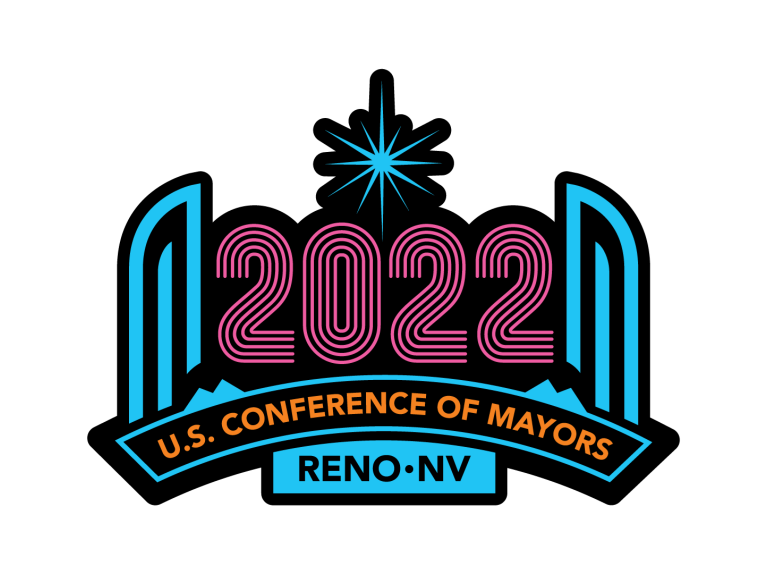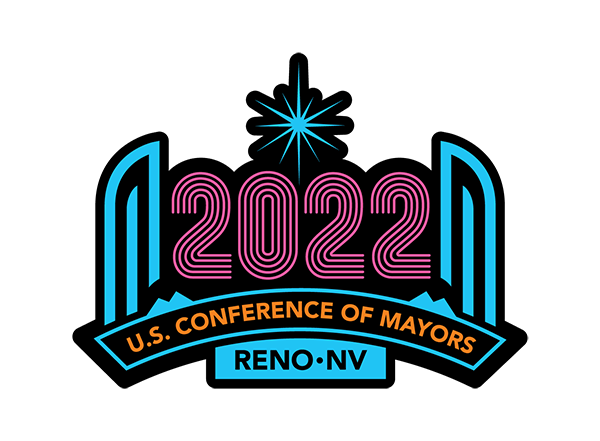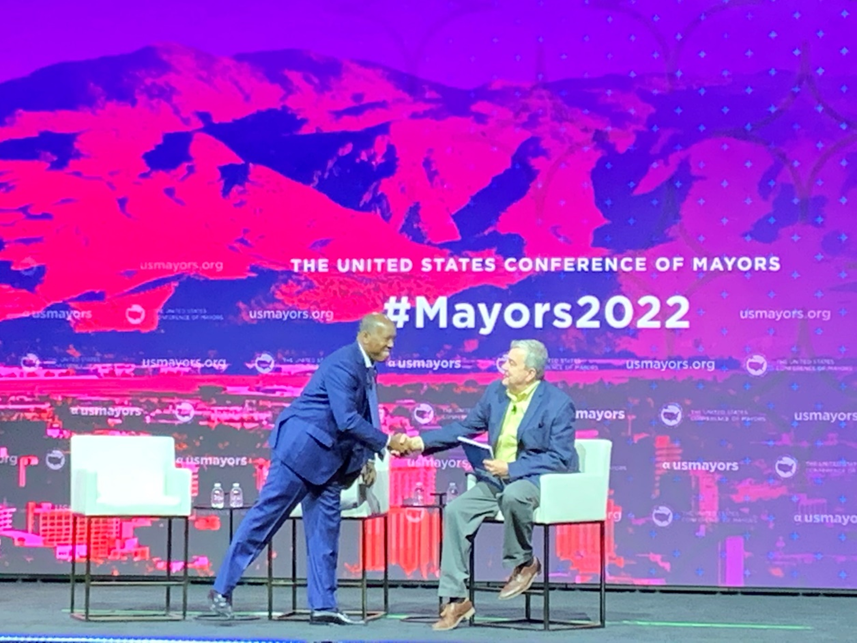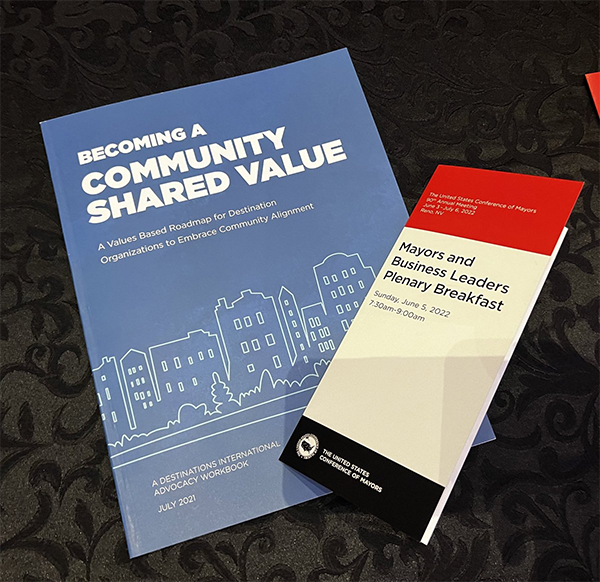
By: Jack Johnson, Destinations International
This past weekend, Destinations International presented and hosted a General Session for the 90th Annual Meeting of The United States Conference of Mayors in Reno, Nevada. The meeting hosted almost 200 mayors from across the country, plus their key staff members and was presided over by Miami Mayor Francis Suarez and hosted by Reno Mayor Hillary Schieve.
Priorities for the meeting included the intersection of public safety and technology, and the new crypto economy, the threat of disinformation, the state of mental health for all ages in our nation, the further implementation of the $1.2 trillion infrastructure law and other initiatives of the Biden - Harris administration. And, thanks to Destinations International’s underwriting of the Sunday Mayors and Business Leaders Plenary Breakfast, using destination organizations as a key element in economic development strategies and as owners of the city brand was added to the list.
Our key message was that it is no longer just about putting heads in beds; it is about a single city and destination brand driven and cared for by the destination organization. And we underscored that with a mainstage session featuring the city of Houston.

The following is taken from my opening remarks at that session.
“We would like to spend a few moments speaking about what Destinations International sees as the evolving role of destination organizations. They are no longer solely focused on putting heads in beds. Instead, they are focused on the larger mission of brand management and visitation development – whether [visitors] stay in a hotel or not. It is through this that they help develop opportunities and build quality of life that benefit all the residents of a community.
We tell our members that while visitors are a critical ingredient to a community’s success, and hotel, restaurants and attractions are necessary tools to facilitate travel to your community, a destination organization’s ultimate customer is their residents.
Every one of your communities must compete with every other community across the globe for your share of the world’s attention, customers, talent, and investment. That is why destination organizations work – or should be working – as essential parts of your economic development strategy.
See, to compete, people need to be aware of your community, have a positive impression, and want to visit to experience your community, your culture, and meet its people.
This is achieved through clearly developing, articulating, and managing the community’s brand. It involves promoting, marketing, selling, and engaging potential visitors. And all of this must be reinforced again and again.
If you can develop a brand message that accurately reflects your whole community, a brand message that can capture people’s attention and imagination, then you have created a place where people want to visit. And if you have done that then you have created a place where people want to live. Which means you have created a place where people want to work. Which means that then you have created a place where employers will need to be. It all starts with a strong community’s brand that drives a visit.
Destination organizations are uniquely positioned to help make this happen. That means that destination organizations are “community assets” responsible for programs promoting their community not only as an attractive travel destination – but also enhancing its public image as a dynamic place to live and work.
In other words, it is not just about putting heads in beds anymore.”
Then I asked Houston Mayor Sylvester Turner and Michael Heckman, President and CEO of the Houston First Corporation that serves as the city’s destination organization, to join me on stage where we had a brief conversation about how Houston is taking this approach and having success.

We talked about the power of a brand. In Houston’s case I pulled from the city’s vision statement:
“Houston offers opportunity for all and celebrates its diversity of people, economy, culture, and places. Houston promotes healthy and resilient communities through smart civic investments, dynamic partnerships, education, and innovation. Houston is the place where anyone can prosper and feel at home.”
Both Mayor Turner and Michel Heckman talked about the importance of the brand and leading with that instead of facts and figures. That the brand needed to represent everyone in a city. That it be value-based and authentic. And perhaps most importantly, that the city speak through that brand. There are not different brands based on whether it is tourism or economic development or workforce development or any other vertical. One city, one brand and everyone uses it. And the destination organization is the holder and storyteller of that brand.
We also spent some time discussing how Houston integrates that brand into the city’s convention, events, and tourism strategy to help grow Houston. Houston has pivoted from being an oil and gas center to being a global energy center as well as a leader in responding to climate change. The city has strong and growing health care, manufacturing, aeronautics, and transportation sectors. And the city has made it a priority to be a global gateway city. Mayor Turner and Michael Heckman gave specific examples on how these strategies are reflected in Houston First’s efforts.
Finally, we talked about the success of these efforts. I pointed out that this past summer Time magazine included Houston among the World’s Greatest Places, noting Houston is distinctive in its “ingenuity, creativity, revitalization and reopenings.” That recently Forbes wrote that “as one of the most diverse cities in the United States, Houston boasts an exciting mix of cultures, food, art, sport, and green space to explore. The city’s harmonizing diversity is what makes ‘H-town’ truly unique.”

I pointed out that Houston has been one of the fastest growing cities in North America while becoming the most racially and ethnically diverse large metropolitan areas in the United States. And it is not just people. Houston’s corporate inventory is growing too. In other words, Houston has attracted the world’s attention. They are attracting customers, talent, and investment. As Mayor Turner pointed out, they have done this while facing six 500-year floods in as many years, periodic hurricanes, tropical storms, and deep freeze in 2021 that almost brought the state’s power grid to failure. That shows the power of a brand well-articulated by a destination organization and embodied by the city government starting with the mayor.
You may watch the session here. It begins around the 17:00 mark.
This experience is not a one and done. Our efforts in Reno this year mark the start of a 12-month activations program with the US Conference of Mayors on various topics and will include involvement in the winter meeting this January in Washington, DC and the summer meeting in 2023 in Columbus, Ohio. And during this period, we will begin to expand outreach efforts to the National League of Cities, the National Association of Counties, the National Governor’s Association and the National Conference of State Legislators in the United States as well as similar organizations in Canada.
In other words, it is no longer just about putting heads in beds. It is about being a community asset.

